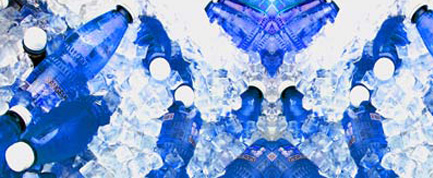The Truth About 'Healthy' Bottled Water

The Coca-Cola Company announced on Friday that it will purchase Glaceau, the maker of Smartwater and Vitaminwater, for $4.2 billion in cash.
But health-conscious consumers of Glaceau products need not worry about such an aggressive take-over from a soda pop manufacturer. Coke has assured us that the colorful water drinks will remain expensive and calorie-dense with the pretense of health, just the way we like it, apparently.
Coke said the purchase will better position the company in the multibillion-dollar beverage market where consumers are turning away from unhealthy drinks like sodas toward marginally healthier sugary teas, sugary waters or overpriced bottled water.
Sugar water
The Coca-Cola Company seems like the natural manufacturer for Vitaminwater, which is sort of a "Coke lite" with its sugar and coloring. All that's missing is the fizz. After water, the next ingredient in Vitaminwater is sugar. Maybe they consider this vitamin S? There's about 30 grams of sugar in each bottle, adding up to about 125 calories. (Yes, only 50 calories per serving, if you share the bottle with 1.5 other people.)
You can make Vitaminwater at home for a fraction of the cost by starting with a vitamin and water and adding eight packets of sugar. A vitamin pill with just water would be about zero calories.
It's hard to imagine calling something a health drink when it has up to half the sugar as Coke. Vitaminwater might be tasty and refreshing--and indeed you might find this to be a perfect alternative to soda pop--but you'd be fooling yourself if you consider this anything more than a beverage.
Sign up for the Live Science daily newsletter now
Get the world’s most fascinating discoveries delivered straight to your inbox.
Scurvy no longer an issue
Most Americans are not vitamin-deprived. The problem here is diabetes and obesity, which Vitaminwater doesn't help aside from weaning folks off of soda pop.
What enables Glaceau to pitch Vitaminwater as a health drink? The company is proud of its vapor-distilled water, which actually provides fewer health benefits than regular water because all the minerals have been removed. Then there are the vitamins--depending on which flavor you buy--which you can get in a pill form, if you are so inclined, or in your food, which is what doctors recommend.
Both Vitaminwater and Smartwater contain electrolytes, which are ions of sodium, chloride, potassium, calcium, magnesium, phosphate and hydrogen carbonate. Sports drinks contain these, too, and they are overly hyped. Studies show that for most of us, water is perfect for hydrating oneself during exercise. Only during vigorous exercise for well over an hour does one benefit from the salts and carbohydrates found in sports drinks. A case for purity
Glaceau boast on its labels and website the motto "vitamins + water = all you need." Unfortunately the list of ingredients suggests otherwise. Glaceau should win an award, though, for the most humorous labeling. It's "balance" flavor is recommended for "clowns who ride unicycles while juggling chainsaws;" and the "endurance" flavor contains the warning "usage may result in increased stamina (no, not in that way)."
You can read more on Glaceau's Web site, which is unfortunately so slow with Flash animations of dancing bottles that you will die of thirst before reading what's in the stuff.
Coca-Cola is not incapable of producing healthy beverages. The company is a major producer of delicious and healthy unsweetened teas in Japan. Most vending machines in Japan have more varieties of tea than we have of soda.
It's a shame that Americans can't acquire a taste for unsweetened tea, a true health drink. Green tea in the United States is really a green tea drink with, you guessed it, sugar and other natural and artificial flavors and preservatives and so on.
Christopher Wanjek is the author of the books “Bad Medicine” and “Food At Work.” Got a question about Bad Medicine? Email Wanjek. If it’s really bad, he just might answer it in a future column. Bad Medicine appears each Tuesday on LiveScience.

Christopher Wanjek is a Live Science contributor and a health and science writer. He is the author of three science books: Spacefarers (2020), Food at Work (2005) and Bad Medicine (2003). His "Food at Work" book and project, concerning workers' health, safety and productivity, was commissioned by the U.N.'s International Labor Organization. For Live Science, Christopher covers public health, nutrition and biology, and he has written extensively for The Washington Post and Sky & Telescope among others, as well as for the NASA Goddard Space Flight Center, where he was a senior writer. Christopher holds a Master of Health degree from Harvard School of Public Health and a degree in journalism from Temple University.









